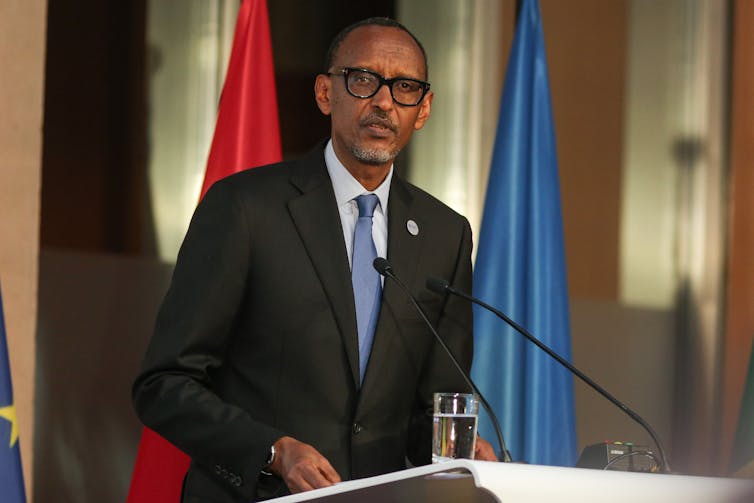
Marie E. Berry, University of Denver and Laura Mann, London School of Economics and Political Science
Rwanda has emerged as a model for economic development. The country has taken great strides just 25 years since its horrific genocide. But at the same time the government under President Paul Kagame has been widely criticised for its authoritarian tactics and use of violence against those who oppose it.
Rwanda stands out for many good things. It has the highest number of women in politics anywhere in the world. More than half the members of Parliament in the country’s lower house are female.
Rwanda also has an impressive technology track record. The country is known for the innovative use of technology to deliver essential services like blood. It also has extensive internet infrastructure, which covers over 95% of the country. And of course, Rwanda also continues to record impressive economic growth.
But there are reasons to be cognisant of the wider context.
In our article we discuss the political motivations behind Rwanda’s developmental state. Although published three years ago, we believe many points still hold true.
Our research helps explain Rwanda’s status as both a development miracle and international pariah prone to authoritarian tactics. In it, we show how markets have served as spaces through which the Rwandan state has deepened its power.
In other words, growth and social control in Rwanda have gone hand in hand.
Two points are worth emphasising to better grasp the Rwandan case. The first is to understand the political motives behind Rwanda’s developmental priorities. The second is to take account of Rwanda’s history – particularly its histories of violence.
Capitalism and development
First, political motivations always underscore economic development. The rise of enterprise thinking within development circles has tended to cloak that reality. This way of thinking frames development as a technocratic challenge and portrays markets as apolitical spaces where “economics” can work.
Debates at the World Bank, United Nations Development Programme, and other international development agencies suggest that states must put aside politics to get serious about development.
Yet this approach neglects a large body of social science literature that emphasises how, historically, deepening state power sets the stage for capitalist growth. For example, sociologists and economic historians have shown how the expansion of European state power provided the framework for private sector coordination and the development of market economies.
Scholars have also shown how the fast-growing East Asian tigers benefited from a form of state-directed capitalism. In these instances interdependent relationships were forged between political leaders and entrepreneurs.
In both periods, development was an outcome – and an ingredient – of the wider consolidation of state power.
There have been debates about whether the state-led model of development can be replicated in African countries. Some have argued that African political systems are not conducive to this model of development as a result of the arbitrary way in which African states were formed and the stunting of indigenous capitalists during the colonial period. The consequence has been what some scholars have termed predatory business-state relationships.
But some states, including Rwanda, have successfully used joint ventures between the state and ruling party to centralise investment in priority areas while cracking down on more overt and unproductive forms of corruption at the lower levels.
History of violence
Rwanda’s recent history has been marred by multiple periods of widespread insecurity which galvanised the current regime on a development path.
The foremost security threat has been the legacy of the Hutu sectarianism that generated genocide. Others include challenges to Kagame’s control through opposition movements like the Rwanda National Congress, and continued instability in neighbouring Democratic Republic of the Congo.
The government has adopted a range of tactics to mitigate these threats. Some are obvious, such as visible security stationed around the country. Others are more subtle. One example is the social payments (such as cash transfers to the poorest sectors of the population) which have been used to quell frustration among Rwandans who feel left out of the country’s development progress.
But the government also has a tendency to overstate potential threats. This effectively legitimises the militarisation of Rwanda’s borders and justifies increased security crackdowns. The government’s recent decision to close its northern border with Uganda and issue travel advisories is a good example. Purportedly in the name of security, this decision follows a pattern of other exaggerations to justify increased militarisation. Kagame’s subsequent comments have led some to worry that the government is laying the ground for a military strike to destabilise the Ugandan government.
So what’s the connection between the tendency to militarise events, and development?
Political-military elite
We argue that the development of markets has helped consolidate the power of a political-military elite at the helm of the economy. Investments and industrial policies have created robust growth. At the same time, they have strengthened those with close ties to the ruling party’s inner circle.
That’s not to say that the Rwandan state has not used its growth and attractive investment climate to build infrastructure, extend social services and boost further transformation. Indeed, its ability to command respect and loyalty from the population depends on a pathway of sustainable growth. Yet, economic transformation in Rwanda, like transformation in all other countries of the world, has a political logic and reflects a pattern of political and class consolidation.
What remains to be seen is how durable this model will be in a context of slow and uneven development, and in a global economy where the challenge of real structural transformation grows ever more competitive. Despite the government’s emphasis on development, many Rwandans remain immensely poor and their entry into markets often corresponds with frequent state incursions into their lives.
Marie E. Berry, Assistant Professor, Josef Korbel School of International Studies, University of Denver and Laura Mann, Assistant Professor, Department of International Development, London School of Economics and Political Science
This article is republished from The Conversation under a Creative Commons license. Read the original article.
